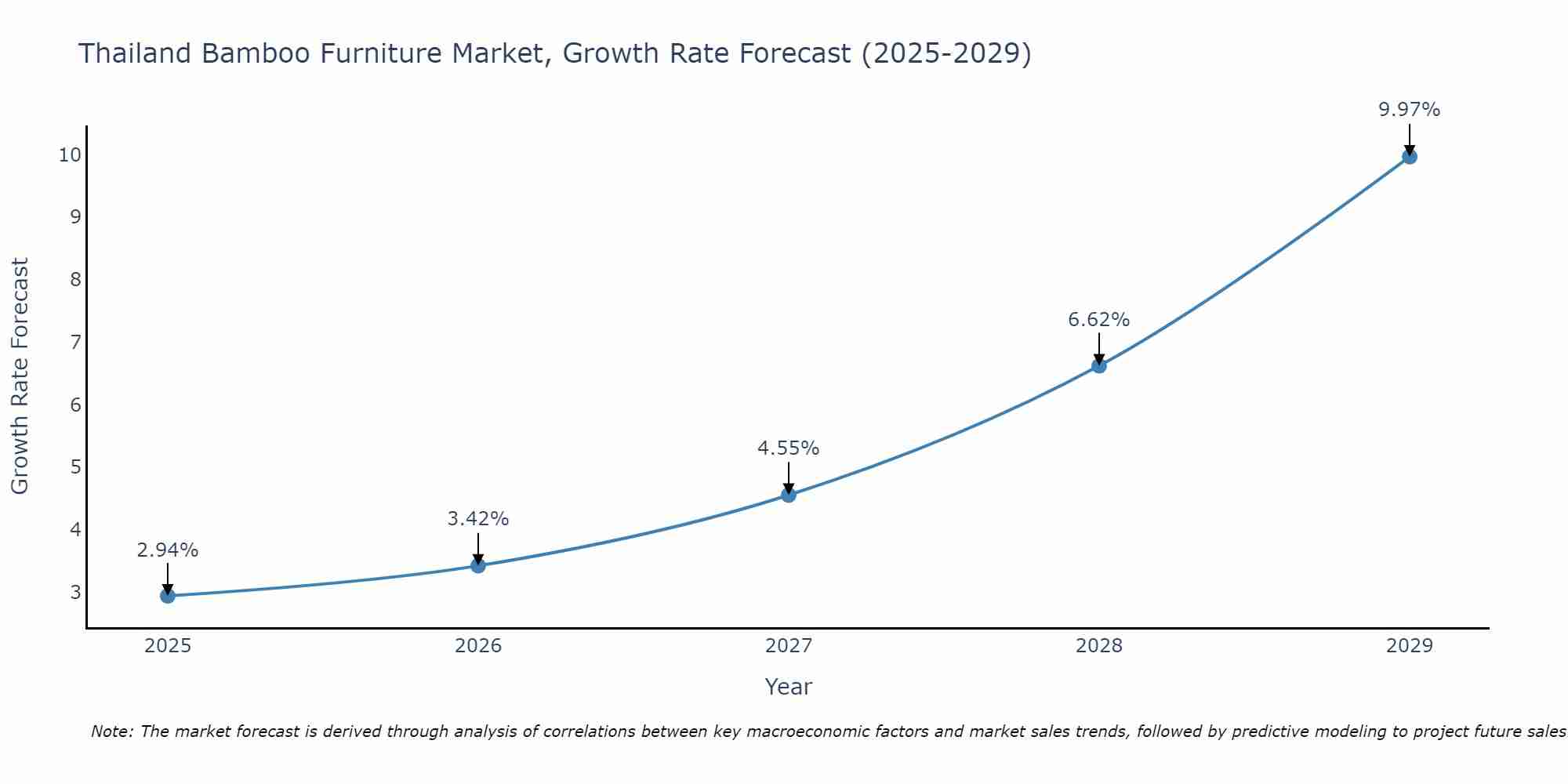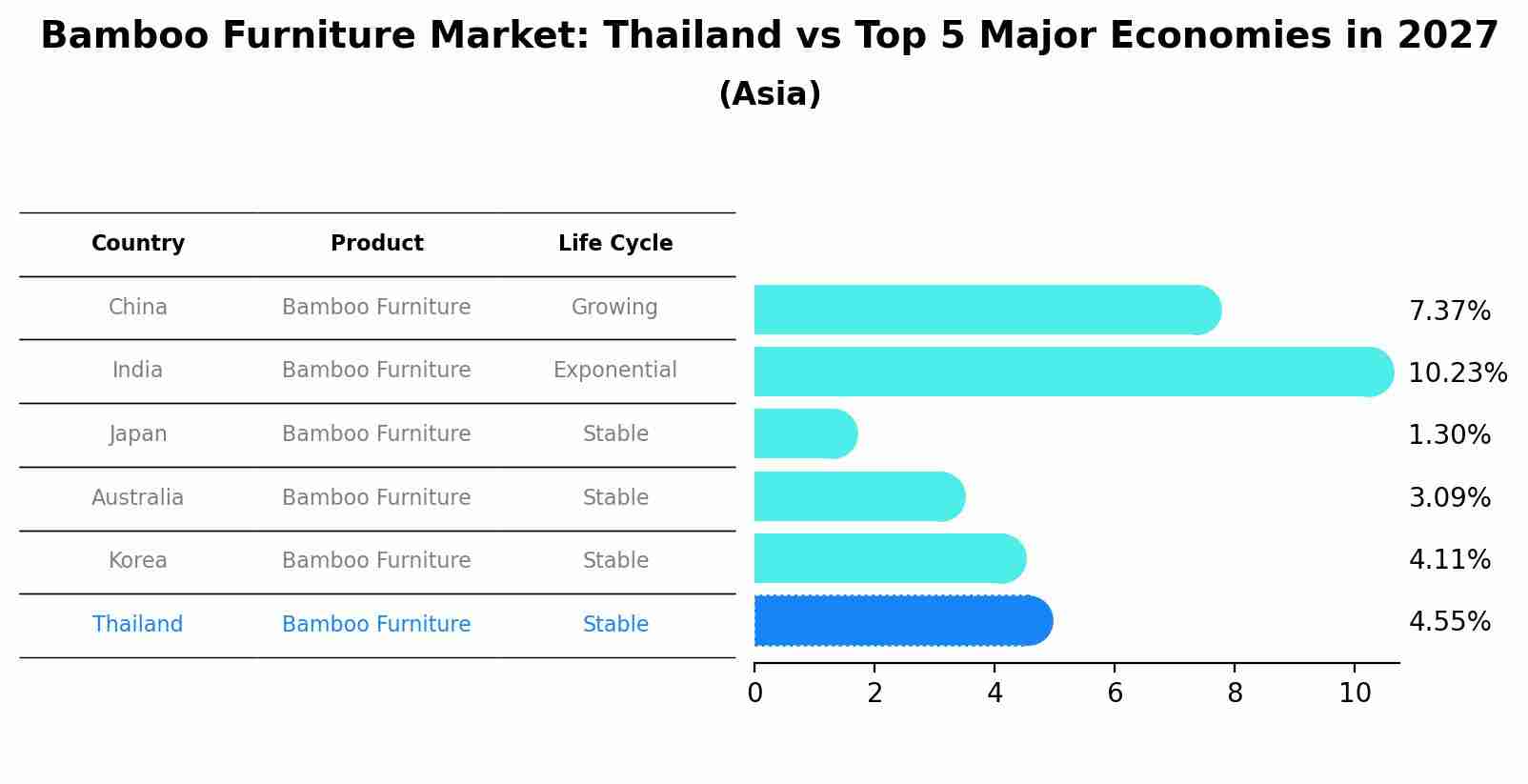Thailand Bamboo Furniture Market (2025-2031) Outlook | Value, Industry, Forecast, Companies, Revenue, Trends, Size, Analysis, Share & Growth
| Product Code: ETC370885 | Publication Date: Aug 2022 | Updated Date: Apr 2025 | Product Type: Market Research Report | |
| Publisher: 6Wresearch | No. of Pages: 75 | No. of Figures: 35 | No. of Tables: 20 | |
Thailand Bamboo Furniture Market Size Growth Rate
The Thailand Bamboo Furniture Market is poised for steady growth rate improvements from 2025 to 2029. The growth rate starts at 2.94% in 2025 and reaches 9.97% by 2029.

Bamboo Furniture Market: Thailand vs Top 5 Major Economies in 2027 (Asia)
The Bamboo Furniture market in Thailand is projected to grow at a stable growth rate of 4.55% by 2027, highlighting the country's increasing focus on advanced technologies within the Asia region, where China holds the dominant position, followed closely by India, Japan, Australia and South Korea, shaping overall regional demand.

Thailand Bamboo Furniture Market Synopsis
The Thailand bamboo furniture market reflects a growing interest in eco-friendly and sustainable home furnishings. Bamboo, known for its durability and sustainability, has gained popularity as a material of choice in furniture manufacturing. Consumers in Thailand are becoming more environmentally conscious, driving the demand for bamboo furniture. Additionally, the tourism sector plays a role in this market, as hotels and resorts often use bamboo furniture to create a natural and inviting ambiance. Local artisans and manufacturers are capitalizing on this trend, producing a wide range of bamboo furniture products to cater to diverse consumer preferences.
Drivers of the Market
The Thailand bamboo furniture market is witnessing growth driven by several factors. Firstly, the rising awareness of sustainability and eco-friendliness is leading consumers to opt for bamboo furniture as an environmentally responsible choice. Bamboo is a fast-growing and renewable resource, making it an attractive material for furniture production. Additionally, the aesthetic appeal of bamboo furniture, with its natural textures and designs, is contributing to its popularity. The market is also benefitting from the increasing trend of incorporating natural elements into interior decor, with bamboo furniture being a preferred choice.
Challenges of the Market
The Thailand bamboo furniture market faces challenges related to sustainability and the environment. While bamboo is a renewable resource, overexploitation and poor harvesting practices can harm ecosystems. Ensuring a sustainable and ethical supply chain is crucial. Moreover, competition from other materials and the need for innovative designs to attract consumers pose additional hurdles.
COVID-19 Impact on the Market
The Thailand bamboo furniture market saw a slowdown during the COVID-19 pandemic, primarily due to disruptions in the supply chain and manufacturing processes. Lockdowns and restrictions affected the production and distribution of bamboo furniture. Additionally, as consumer priorities shifted towards essential goods and home office setups, the demand for furniture decreased temporarily. The market, however, exhibited resilience as eco-friendly and sustainable products gained popularity, and it is expected to rebound as consumer confidence returns.
Key Players in the Market
In the Thailand bamboo furniture market, BambooCraft Creations, EcoLiving Furniture, and GreenBamboo Designs are prominent players. They manufacture eco-friendly and stylish bamboo furniture items, catering to the growing demand for sustainable and aesthetically pleasing home furnishings.
Key Highlights of the Report:
- Thailand Bamboo Furniture Market Outlook
- Market Size of Thailand Bamboo Furniture Market, 2024
- Forecast of Thailand Bamboo Furniture Market, 2031
- Historical Data and Forecast of Thailand Bamboo Furniture Revenues & Volume for the Period 2021-2031
- Thailand Bamboo Furniture Market Trend Evolution
- Thailand Bamboo Furniture Market Drivers and Challenges
- Thailand Bamboo Furniture Price Trends
- Thailand Bamboo Furniture Porter's Five Forces
- Thailand Bamboo Furniture Industry Life Cycle
- Historical Data and Forecast of Thailand Bamboo Furniture Market Revenues & Volume By Type for the Period 2021-2031
- Historical Data and Forecast of Thailand Bamboo Furniture Market Revenues & Volume By Chairs & Tables for the Period 2021-2031
- Historical Data and Forecast of Thailand Bamboo Furniture Market Revenues & Volume By Stools for the Period 2021-2031
- Historical Data and Forecast of Thailand Bamboo Furniture Market Revenues & Volume By Beds for the Period 2021-2031
- Historical Data and Forecast of Thailand Bamboo Furniture Market Revenues & Volume By Others for the Period 2021-2031
- Historical Data and Forecast of Thailand Bamboo Furniture Market Revenues & Volume By End User for the Period 2021-2031
- Historical Data and Forecast of Thailand Bamboo Furniture Market Revenues & Volume By Residential for the Period 2021-2031
- Historical Data and Forecast of Thailand Bamboo Furniture Market Revenues & Volume By Commercial for the Period 2021-2031
- Thailand Bamboo Furniture Import Export Trade Statistics
- Market Opportunity Assessment By Type
- Market Opportunity Assessment By End User
- Thailand Bamboo Furniture Top Companies Market Share
- Thailand Bamboo Furniture Competitive Benchmarking By Technical and Operational Parameters
- Thailand Bamboo Furniture Company Profiles
- Thailand Bamboo Furniture Key Strategic Recommendations
Frequently Asked Questions About the Market Study (FAQs):
- Single User License$ 1,995
- Department License$ 2,400
- Site License$ 3,120
- Global License$ 3,795
Search
Related Reports
- ASEAN and Thailand Brain Health Supplements Market (2025-2031) | Strategy, Consumer Insights, Analysis, Investment Trends, Opportunities, Growth, Size, Share, Industry, Revenue, Segments, Value, Segmentation, Supply, Forecast, Restraints, Outlook, Competition, Drivers, Trends, Demand, Pricing Analysis, Competitive, Strategic Insights, Companies, Challenges
- ASEAN Bearings Market (2025-2031) | Strategy, Consumer Insights, Analysis, Investment Trends, Opportunities, Growth, Size, Share, Industry, Revenue, Segments, Value, Segmentation, Supply, Forecast, Restraints, Outlook, Competition, Drivers, Trends, Demand, Pricing Analysis, Competitive, Strategic Insights, Companies, Challenges
- Europe Flooring Market (2025-2031) | Outlook, Share, Industry, Trends, Forecast, Companies, Revenue, Size, Analysis, Growth & Value
- Saudi Arabia Manlift Market (2025-2031) | Outlook, Size, Growth, Trends, Companies, Industry, Revenue, Value, Share, Forecast & Analysis
- Uganda Excavator, Crane, and Wheel Loaders Market (2025-2031) | Strategy, Consumer Insights, Analysis, Investment Trends, Opportunities, Growth, Size, Share, Industry, Revenue, Segments, Value, Segmentation, Supply, Forecast, Restraints, Outlook, Competition, Drivers, Trends, Demand, Pricing Analysis, Competitive, Strategic Insights, Companies, Challenges
- Rwanda Excavator, Crane, and Wheel Loaders Market (2025-2031) | Strategy, Consumer Insights, Analysis, Investment Trends, Opportunities, Growth, Size, Share, Industry, Revenue, Segments, Value, Segmentation, Supply, Forecast, Restraints, Outlook, Competition, Drivers, Trends, Demand, Pricing Analysis, Competitive, Strategic Insights, Companies, Challenges
- Kenya Excavator, Crane, and Wheel Loaders Market (2025-2031) | Strategy, Consumer Insights, Analysis, Investment Trends, Opportunities, Growth, Size, Share, Industry, Revenue, Segments, Value, Segmentation, Supply, Forecast, Restraints, Outlook, Competition, Drivers, Trends, Demand, Pricing Analysis, Competitive, Strategic Insights, Companies, Challenges
- Angola Excavator, Crane, and Wheel Loaders Market (2025-2031) | Strategy, Consumer Insights, Analysis, Investment Trends, Opportunities, Growth, Size, Share, Industry, Revenue, Segments, Value, Segmentation, Supply, Forecast, Restraints, Outlook, Competition, Drivers, Trends, Demand, Pricing Analysis, Competitive, Strategic Insights, Companies, Challenges
- Israel Intelligent Transport System Market (2025-2031) | Strategy, Consumer Insights, Analysis, Investment Trends, Opportunities, Growth, Size, Share, Industry, Revenue, Segments, Value, Segmentation, Supply, Forecast, Restraints, Outlook, Competition, Drivers, Trends, Demand, Pricing Analysis, Competitive, Strategic Insights, Companies, Challenges
- Uganda Precast and Aggregate Market (2025-2031) | Strategy, Consumer Insights, Analysis, Investment Trends, Opportunities, Growth, Size, Share, Industry, Revenue, Segments, Value, Segmentation, Supply, Forecast, Restraints, Outlook, Competition, Drivers, Trends, Demand, Pricing Analysis, Competitive, Strategic Insights, Companies, Challenges
Industry Events and Analyst Meet
Our Clients
Whitepaper
- Middle East & Africa Commercial Security Market Click here to view more.
- Middle East & Africa Fire Safety Systems & Equipment Market Click here to view more.
- GCC Drone Market Click here to view more.
- Middle East Lighting Fixture Market Click here to view more.
- GCC Physical & Perimeter Security Market Click here to view more.
6WResearch In News
- Doha a strategic location for EV manufacturing hub: IPA Qatar
- Demand for luxury TVs surging in the GCC, says Samsung
- Empowering Growth: The Thriving Journey of Bangladesh’s Cable Industry
- Demand for luxury TVs surging in the GCC, says Samsung
- Video call with a traditional healer? Once unthinkable, it’s now common in South Africa
- Intelligent Buildings To Smooth GCC’s Path To Net Zero













